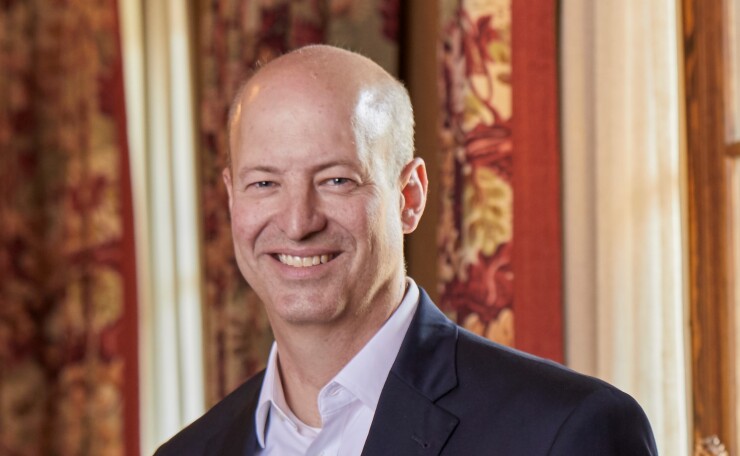The Financial Accounting Foundation has abandoned its tradition of selecting a state auditor to chair the Governmental Accounting Standards Board by picking a private sector accountant to serve the seven-year term beginning July 1.
Three public sector associations said Tuesday they are “duly concerned” about this “unilateral change to the long-standing composition of the GASB” and will decide on “an appropriate path forward.”

The groups noted that the incoming chairman Joel Black is “highly qualified” to serve on the GASB board as a representative of the public accounting profession.
But Black’s selection means that no former state auditor or treasurer will be among the seven members of the GASB board after the current chairman, former Iowa State Auditor David Vaudt, ends his term on June 30.
The chairman is the only full-time member of the seven-member GASB board. Vaudt received $691,083 in total compensation as GASB chairman in 2018, according to the Financial Accounting Foundation’s Form 990 filed with the Internal Revenue Service.
Black is the partner in charge of the audit practice at the Atlanta accounting firm Mauldin & Jenkins where he oversees the audit practice of the firm’s eight offices in five states. Black also leads the firm’s government professional practice group covering more than 400 public sector clients.
According to GASB, Black has personally led audits for a diverse range of government clients including communities of fewer than 10,000 residents to states and state agencies, large counties and cities, school districts, and special-purpose entities with multibillion-dollar budgets.
The National Association of State Auditors, Comptrollers and Treasurers (NASACT), the National Association of State Treasurers (NAST), and the Government Finance Officers Association (GFOA) said the absence of a state auditor or treasurer “fundamentally compromises the diversity of the GASB.”
“GASB sets generally accepted accounting principles (GAAP) for state and local governments,” the joint statement said. “However, states themselves — often state auditors — have the sole responsibility to determine accounting and financial reporting standards for their state and local jurisdictions. Thus, state support of GAAP is essential for its continued and increased widespread use.”
GASB is in the early stages of three major projects that are promising to provide a comprehensive update to government financial reporting.
Vermont State Treasurer Beth Pearce said in an interview that Black's appointment means the GASB board will have two private sector representatives.
“We need to have a dialogue on how we address these things in the future,” Pearce said.
Another GASB board member — college professor Michael H. Granof — has a term ending June 30. Granof is the Ernst & Young Distinguished Centennial Professor of the McCombs School of Business at the University of Texas at Austin, where he has been a member of the faculty since 1972. Pearce declined to comment on whether appointing a state treasurer or auditor to that seat would be an acceptable workaround.
“I think right now we need to have a dialogue first,” Pearce said. “I think we ought to improve the composition of the Financial Accounting Foundation board.”
Although all states follow GASB’s GAAP standards, most states don’t adhere to them on all county and local levels. State auditors set the accounting standards for local governments in many states.
The Texas legislature has established its own standard for Other Post Employment Benefits, for instance, although Texas state government still follows GASB.
Black's selection may have been influenced by the longstanding criticism some states have received for underfunding their public employee pension systems.
Some critics have blamed GASB’s rules, rather than the state officials who are responsible for the pension plan underfunding.
In a newspaper op-ed last August, George Schultz, a former cabinet member under two Republican administrations, and David Crane, a lecturer at Stanford University, wrote: “The key to reforming GASB lies in its chair, who is the only full-time GASB board member.”
“The next recession will expose those state and local governments that have used GASB’s permissive rules to cover up deep financial problems, potentially forcing the federal government to step in to finance core public services,” Schultz and Crane wrote in the San Francisco Chronicle.
FAF’s 15-member board may have heeded that advice, but the public sector associations say they were not consulted in advance about that change in policy.
Pearce declined to comment on whether critiques such as the one by Schultz and Crane played a role in Black’s selection. “We need to have a conversation first,” she said, noting that she’s a strong advocate of defined pension plans.
Outgoing GASB chairman Vaudt served as Iowa’s elected state auditor for 10 years and earlier served on the Iowa Accountancy Examining Board from 1995 through 2002.
Vaudt also worked in the private sector for 25 years in the Des Moines, Iowa, office of KPMG LLP, including 13 years as an audit partner.





